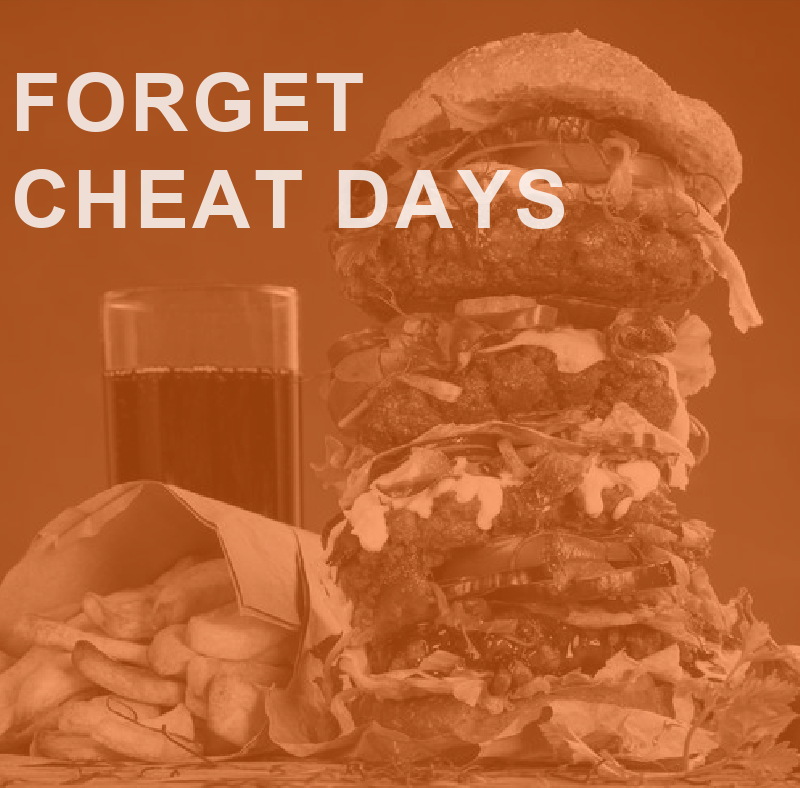
The importance of a weight-loss client’s relationship with food, and how poor messaging from social and mainstream media (let alone misinformation from family, friends, and even health professionals) can confuse those trying to adopt a healthy lifestyle into believing aesthetics take priority and quick fat loss diets are the optimal path. Neither are correct. Part and parcel with dysfunctional relationships with food and dieting are popular “cheat days”–this notion that you should eat on point for six days a week and then eat freely on day seven. Let’s explore why this doesn’t work for the average personal training client with a fat loss goal and what you can do to help reprogram their mindset.
Forget “Cheat Days”
For the average client who isn’t working towards body composition goals, and is instead pursuing long-lasting weight loss and overall well-being, the idea of cheat days can and should probably just be dropped. When clients talk to me about how challenging their diet is and that they can’t wait for it to be over I always ask them how will they know when it’s over?
Usually the response is, when they have lost “x ” amount of weight. Then I ask them if they are willing to go through this process again? And again? Of course they say no, because who wants to be constantly changing their eating habits from restriction and overconsumption? Gaining and losing weight? Remaining in an endless cycle of yo-yo dieting?
This is where the conversation about steady moderation over constant deprivation comes in.
Why Dieting Doesn’t Work
The main problem with the conventional “diet” is that it has a beginning and an end. It certainly isn’t healthy for a person’s one focus to be their weight. In fact, obsession with one’s weight is a major criterion of an eating disorder or body dysmorphia. However, being aware of one’s weight and wanting to maintain a healthy range for their age, gender, and height is an important part of obtaining optimal health and wellness.
So how can a diet start and end when all of us want to be healthy and fit all of our lives?
Moderation really is the secret– the magic trick that everyone is looking for when it comes to long term weight loss and maintenance. Allowing yourself to have a little bit of something sweet, decadent or rich every day is actually okay. Having one or (gasp) even two cookies will not derail progress made in the gym, provided the overall diet is nutrient-rich and whole-foods oriented, while still creating a caloric deficit.
Allowing yourself to have a full-fat latte will not add obscene poundage, unless you’re having five a day and consuming 1000 calories over your maintenance needs. It’s about a food budget that we must manage every day; sometimes you want to spend a little more on the muffin for breakfast so you spend a little less at dinner by skipping on the rice and loading up on the roasted veggies and lean protein.
Food is a wonderful part of being alive and it should be celebrated as such. It not only nourishes our bodies but it brings us joy and comfort. When we live with a perspective of food being a nemesis or a source of weakness, we set ourselves up for failure. Food is a necessity and it will always be a part of every day in our lives. Learning to eat in moderation and balance is the key to being able to enjoy all the yummy and soul-filling foods all our life, while also being healthy and strong.
Why Cheat Days Don’t Work
Cheat days are not a concept that the average person handles well. Most people who have been in a mental state of deprivation all week will end up binging on their set cheat day. Rather than just having the one meal, they will end up eating far more than is good for them (and may very easily overconsume calories, keeping them just shy of the deficit needed for weight loss) and that tends to wreck mentality and motivation for the new week ahead.
When we allow ourselves to feel free in how and what we eat, there isn’t this sense of panic thinking, “When will I ever get to enjoy this food again!?” When we stop dividing foods into “on-limits” and “off-limits” categories, we tend to naturally get better at eating intuitively and choosing to eat more nutrient-dense foods based on how they make us feel afterwards.
Food isn’t Good or Bad
Lastly, encourage clients to stop labeling food as good and bad. Words can have such power and when some foods are considered good or healthy and others are labeled as bad and unhealthy, it again creates this adversarial relationship with food as a whole.
Food is food, and will be broken down in our bodies into its basic parts of carbohydrates, fats, and proteins regardless of being “good” or “bad”. This is what all food can be boiled down to– one of these three macros. (Now there may be some debate about some processed “food-like” products qualifying as food, but that’s a separate topic).
Starting to look at food as nutrient-dense and non-nutrient-dense will create a more helpful dichotomy than good and bad. These descriptors are inherently subjective, rife with judgment, and thus confusing; nutrient-dense and non-nutrient-dense are literal definitions of the food—they either are or they aren’t and no one can argue that.
Staying Within Your Scope
Food is a tough subject, and is already a bit restricted for trainers considering our scope of practice. But don’t let either of these make you cautious or afraid to talk with your clients about healthy eating habits. In your client’s eyes, you are a professional of the industry; they will give your words more weight. This offers you an opportunity to not only impact someone’s physical health but their mental health as well.
Exploring and talking with your clients about physiology, the science behind nutrition, and other relevant facts can be the perfect rebuttal to illogical thinking. I know for myself, it was learning and understanding how the metabolism works at 19 that initiated my healing process with an eating disorder. I was floored to learn that starving yourself meant you would only be thin while you were starving. That once you allowed yourself to eat again, the body would be confused and scared for your survival meaning it will store caloric energy rather than using it.
There were still many years ahead of me to heal and unlearn unhealthy habits, but it was the science of it all that got me to thinking a different way. Sometimes that’s all it takes to initiate the change. The facts, and science behind how and why something works (like the metabolism) to get someone thinking about it a bit differently and hopefully in a healthier manner.








